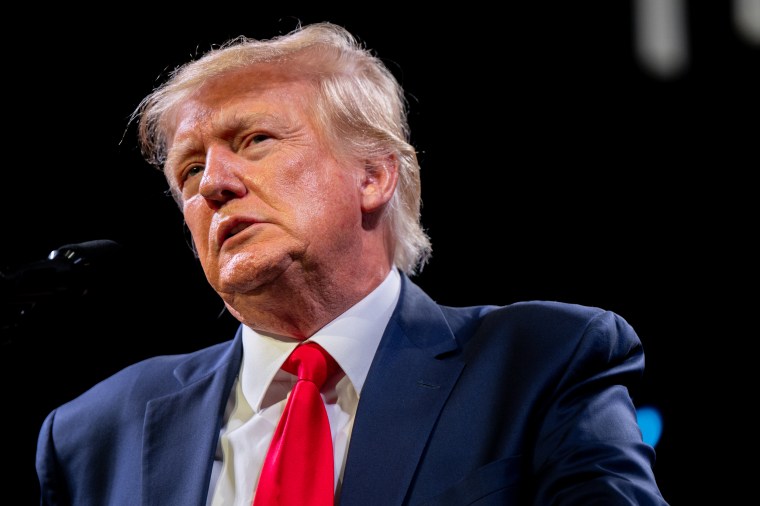Update (Aug. 8, 2022, 7:59 p.m. ET): Former president Donald Trump said Monday that his home at Mar-a-Lago in Palm Beach, Florida, was “raided” by the FBI. Read that story here.
On Tuesday, The Washington Post reported that the Justice Department is investigating former President Donald Trump’s actions as part of its broader Jan. 6 criminal probe. Earlier in the day, in an exclusive interview with Lester Holt on NBC News, Attorney General Merrick Garland suggested that the Justice Department’s federal criminal investigation has moved far beyond the rioters who attacked the Capitol.
Trump should be worried, say many experts.
He’s probably not, though.
Maybe we’re asking the wrong question. Trump may not be worried about the Post report or Garland’s interview. But should he be?
It seems Trump has never been worried about anything. He didn’t seem to worry when the power of the Justice Department was arrayed against him in the form of the Mueller investigation. He mocked the probe with sarcastic tweets. He certainly doesn’t seem too concerned with what he calls the “Un-Select” Jan. 6 committee. So maybe we’re asking the wrong question. Trump may not be worried about the Post report or Garland’s interview. But should he be?
Honestly, I’m not so sure.
Holt asked the right questions. Garland gave answers that were probably workshopped, printed and memorized back at his office long before he arrived on NBC News’ set. The attorney general’s answers didn’t really tell us much about whether Trump is a criminal target. They weren’t bombshells or revelations. They were more like memes. “No one is above the law”? President Theodore Roosevelt said that, too, in 1903. Justice will be pursued “without fear or favor”? That sounds like the same kind of noble language you’d find in the Justice Department’s Principles of Federal Prosecution.
Garland did say the Justice Department “inten[ds] to hold everyone … who was criminally responsible … for any attempt to interfere with the lawful transfer of power from one administration to another accountable.” Did Garland just confirm his investigation extends beyond actual Capitol foot soldiers to include those who crossed the line in challenging election results? It seems like he did. But did anyone really believe the Justice Department was limiting its prosecution to only Capitol rioters and their immediate organizers?
Meanwhile, the Post report provided a lot more detail about the Justice Department’s investigation of Trump. What exactly was revelatory, though? There was never ever any serious doubt that the Justice Department was somehow already looking into all the galactically stupid things Trump and his inner circle did to challenge the election results. There are too many to count: the pressure on the Justice Department to “just say the election was corrupt and leave the rest to me and the Republican congressmen”; the supposed threats against Georgia’s secretary of state; the fake electors; the pressure on Vice President Mike Pence; and, of course, telling a bunch of armed, riled-up supporters to “walk” up to the Capitol “with” Trump, and probably a dozen more.
We all learned about a lot of this bad behavior at Trump’s second impeachment trial shortly after Jan. 6, 2021. We heard even more about it throughout the Jan. 6 committee hearings.
We all learned about a lot of this bad behavior at Trump’s second impeachment trial shortly after Jan. 6, 2021. We heard even more about it throughout the Jan. 6 committee hearings this summer. What’s new, according to The Post? Apparently, the Justice Department has obtained phone records of important Trump officials and aides, including those of his former chief of staff Mark Meadows. But that was back in April. Three months ago. Could this finally be the “smoking gun” that “connects the dots” that leads to the “walls closing in” on Trump? Maybe. Or it might just lead a lot of us to toss around metaphors while we guess. The Justice Department won’t tell us one way or the other until it is ready to tell us. Or indict.
In fairness to Garland, he did exactly what he was expected to do in an interview. That secrecy is, theoretically, what makes the Justice Department so devastatingly effective. It keeps things so hush-hush that there’s no way to know whether the evidence is multiplying behind the closed doors of the grand jury room or whether the investigation has stagnated. Justice officials don’t issue status reports. Often, the first time people learn they are targets of grand jury investigations is when they are indicted. This system works: It’s why the Justice Department convicts more than 90% of defendants it prosecutes.
That’s not to say the Justice Department isn’t investigating Trump or that it doesn’t potentially have damning evidence against him. The Jan. 6 committee seems to have that evidence. And whatever the committee has the Justice Department should have 10 times over. Its resources and methods are just vastly superior. The Justice Department just doesn’t put on presentations and hearings in the course of its investigation. It’s too busy building airtight cases against targets.
And that’s key to understanding Garland’s prosecution analysis process. It’s one thing to believe Trump’s actions fit the essential elements of a federal crime, like obstructing an official proceeding. That’s only the first step. Garland must also believe that the Justice Department can prove that case beyond a reasonable doubt. He must believe prosecutors can overcome executive privilege, immunity, the First Amendment and other defenses. He must believe he can find a jury that isn’t going to be sympathetic to the former president. He needs all the time he can get to make this difficult decision. No wonder he was noncommittal in his interview responses.
Trump should be worried, because everyone should be worried when their names are uttered in connection with federal investigations. But presumably, he’s just as unbothered today as he was last week. Tuesday’s news probably didn’t move the needle bigly.
